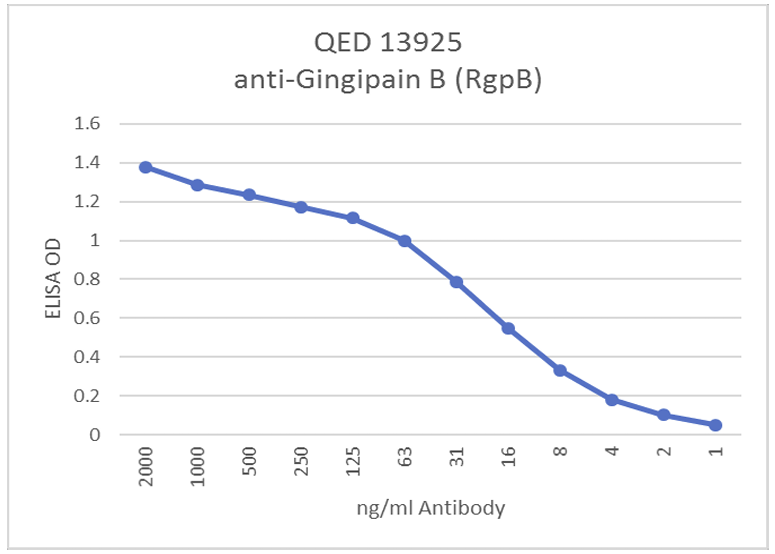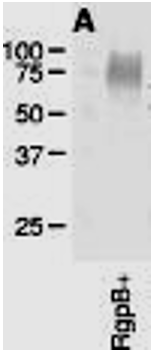Anti-Gingipain B (RgpB) [Clone 18E6.F7]
Anti-Gingipain B (RgpB) [Clone 18E6.F7]
Product No.: 13925
- -
- -
Clone 18E6.F7 Target Gingipain B Formats AvailableView All Product Type Monoclonal Alternate Names RgpB, Arginine-gingipain B Isotype Mouse IgG1 Applications IHC , WB |
Data
 RgpB coated on the solid phase at 4ug/ml. Antibody binding detected with HRP antimouse IgG Fc (1:2,000) and ABTS substrate.
RgpB coated on the solid phase at 4ug/ml. Antibody binding detected with HRP antimouse IgG Fc (1:2,000) and ABTS substrate. - -
- -
Antibody DetailsProduct DetailsReactive Species Poryphyromonas gingivalis Host Species Mouse Immunogen Arginine-gingipain B (RgpB) from Porphyromonas gingivalis. Product Concentration Lot Specific Formulation This monoclonal antibody is formulated in phosphate buffered saline (PBS) pH 7.2 - 7.4 with no carrier protein or preservatives added. State of Matter Liquid Product Preparation Antibodies are purified by a multi-step process including the use of protein A or G to assure extremely low levels of endotoxins, leachable protein A or aggregates. Storage and Handling Upon initial thawing, appropriately aliquot and store at -80°C. For long-term storage, keep at -80°C. Avoid repeated freeze-thaw cycles. Country of Origin USA Shipping Next Day 2-8°C Each investigator should determine their own optimal working dilution for specific applications. See directions on lot specific datasheets, as information may periodically change. DescriptionDescriptionSpecificity This antibody recognizes a unique epitope within the immunoglobulin (Ig)-like domain of arginine-gingipain (RgpB). Background Leinco Technologies is proud to offer a highly specific Arginine-gingipain B (RgpB) antibody, a crucial tool for cutting-edge research into the intricate links between oral health and systemic diseases, particularly Alzheimer's disease (AD). This advanced antibody empowers researchers to accurately detect and characterize RgpB, a key virulence factor of Porphyromonas gingivalis. The Critical Role of RgpB in Periodontal Disease Arginine-gingipain B (RgpB) is a potent cysteine protease produced exclusively by Porphyromonas gingivalis (P. gingivalis), the keystone pathogen in chronic periodontal disease. RgpB plays a central and well-established role in the pathogenicity of P. gingivalis, contributing to tissue destruction and inflammation characteristic of periodontitis. Understanding and targeting RgpB is vital for developing effective diagnostics and therapeutics for this widespread oral infection. Bridging Oral Health and Neurodegeneration: The RgpB-Alzheimer's Connection Recent groundbreaking research has illuminated a compelling and increasingly supported association between chronic periodontitis and Alzheimer's disease (AD). This emerging paradigm suggests that P. gingivalis infiltration may be a contributing factor to AD pathology. Studies have revealed the presence of P. gingivalis and its associated gingipains, including RgpB, in autopsy specimens from the brains of individuals diagnosed with AD. These findings are particularly significant as they show direct correlation with hallmark AD pathologies, such as neurons, tau tangles, and beta-amyloid plaques, as well as detection in the cerebrospinal fluid of AD patients. Gingipain Inhibitors: A Promising Therapeutic Avenue for Alzheimer's The implications of this research are profound. Compelling preclinical studies have demonstrated that oral administration of gingipain inhibitors to mice with established brain infections by P. gingivalis led to a significant decrease in P. gingivalis DNA in the brain. Furthermore, these inhibitors effectively reduced levels of neurotoxic markers like beta-amyloid and the inflammatory mediator tumor necrosis factor-alpha (TNF-α). These results strongly suggest that targeting gingipains could be a novel and effective therapeutic strategy for AD. NCBI Gene Bank ID UniProt.org Research Area Infectious Disease . Neuroscience References & Citations1) Dominy S et al. 2019. Porphyromonas gingivalis in Alzheimer’s disease brains: Evidence for disease causation and treatment with small-molecule inhibitors. Science Advances 5 (1): eaau3333.
2) Nguyen K-A et al. 2007. Does the importance of the C-terminal residues in the maturation of RgpB from Porphyromonas gingivalis reveal a novel mechanism for protein export in a subgroup of Gram-negative bacteria? J Bacteriol 189: 833-843. Technical ProtocolsCertificate of Analysis |




